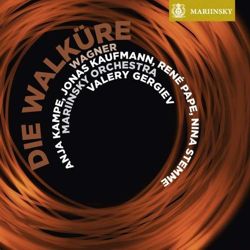|
|
|
|
|
|
|
|
|
San Fancisco Classical Voice, April 5, 2013 |
| By Jason Victor Serinus |
|
|
|
Gergiev’s Starry Die Walküre |
|
| For his second complete Wagner opera recording on high-resolution hybrid SACD, Valery Gergiev has assembled an outstanding cast. Of modern-day Die Walküres, only the Metropolitan Opera’s recent Blu-ray video release from 2012, conducted by James Levine, rivals the star power of Gergiev’s Anja Kampe (as Sieglinde), Jonas Kaufmann (Siegmund), René Pape (Wotan), Nina Stemme (Brünnhilde), and, in smaller roles Ekaterina Gubanova (Fricka) and Mikhail Petrenko (Hunding). |
| |
 Many
of these artists deliver in spades. If Kaufmann carries well over a large
Wagner orchestra, he is truly today’s answer to last century’s Lauritz
Melchior. His instrument glistens like Siegmund’s sword, and his voice
conveys a range of emotions made all the more believable by his (here
unseen) handsome countenance and convincing theatrics. Listen to his moving
dialogue with Stemme’s Brünnhilde in Act 2, Scene 4, where he magnificently
switches between tenderness for his beloved and heroic defiance. If only
Gergiev had let Kaufmann hold “Wälse! Wälse!” half as long as on his recent
Wagner recital. Then again, few conductors let Melchior get away with the
trick. Toscanini surely didn’t. Many
of these artists deliver in spades. If Kaufmann carries well over a large
Wagner orchestra, he is truly today’s answer to last century’s Lauritz
Melchior. His instrument glistens like Siegmund’s sword, and his voice
conveys a range of emotions made all the more believable by his (here
unseen) handsome countenance and convincing theatrics. Listen to his moving
dialogue with Stemme’s Brünnhilde in Act 2, Scene 4, where he magnificently
switches between tenderness for his beloved and heroic defiance. If only
Gergiev had let Kaufmann hold “Wälse! Wälse!” half as long as on his recent
Wagner recital. Then again, few conductors let Melchior get away with the
trick. Toscanini surely didn’t.
Although Stemme sounds far
more mature than the teenager she supposedly is (as does virtually every
Brünnhilde on record), she sings wonderfully. Astrid Varnay (live with
Keilberth) may invest her dialogue with more nuance, but Stemme has the more
beautiful voice. Her first “Hojotoho!” entrance stands out for its extra
whoops of youthful delight as she spurs on her horse, Gräne, from peak to
peak. Would that the recording, good as it is, had been able to capture the
incandescence she brought to the role in San Francisco just a few years
back! (Perhaps it wasn’t there.) Nonetheless, she sounds glorious in her
final plea to her father, the god Wotan.
Pape, one of today’s great
basses, sings with impressive weight and gravity. His Wotan may not be the
expressive equal of Bryn Terfel (with Levine) or Hans Hotter’s (with
multiple conductors, best in the ’50s), though his steadiness, beauty of
voice, and heartfelt sincerity go a long way. Wotan’s farewell to Brünnhilde
is especially touching.
Kampe gets steadier and more confident as the
opera progresses. Yet for some reason the music always seems to slow down
when she sings. Approaching her challenges with care, she only gets going at
the very end of Act 1’s rapture. Despite many fine passages, she comes off
as a distinct second-best to the great Lotte Lehmann, whose thrilling 1935
recording of Act 1 with Melchior and Emanuel List, conducted by Bruno
Walter, is admired by Stemme and a host of other greats. (Then again, who
doesn’t sound second best compared to Lehmann?)
As Wotan’s wife,
Gubanova is quite impressive. The beauty and strength of her top do much to
convince that she knows that she’s got Wotan under her thumb from the
get-go. Petrenko sings beautifully, but that’s the problem: Hunding should
not sound beautiful. Listen to List, the quintessential thug, to hear a
genuine Hunding through and through.
Gergiev offers his share of
fireworks, and more than his fair share of sing-along grunts, but he
occasionally disappoints. His Act 3 “Ride of the Walkyries” is a bit slow
and sluggish, and he misses a golden opportunity to conjure up luminosity in
Act 1 when the door flies open and the glow of springtime fills the stage.
Even in Wagner, you need to smile and smell the flowers before you take
yourself for a wild ride.
Music lovers looking for a well-recorded
alternative to the classic Wagner recordings of 1935–1961 — Sony releases
its remastered, 25-CD set of nine live Met Wagner broadcasts later this
month, including a 1940 Walküre with Flagstad and Melchior — will find ample
rewards in this set.
|
|
|
|
|
|
|
|
|
|
|
|
|
|
|
|
|
|
|